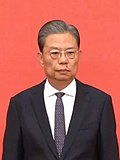| President of the People's Republic of China |
|---|
 | Institution | Presidency | The President is legally China's state representative; he is responsible for China's image. The office is largely ceremonial, so the president cannot intervene directly in matters of the State Council. He, therefore, holds minor responsibilities such as greeting foreign dignitaries and signing the appointment of embassy staff. This position can be held whilst holding others. |
| Current holder | Xi Jinping |
| Birthplace | Beijing, China |
| Constituency | Jiangsu at-large |
| Since | 14 March 2013 |
| Premier of the State Council of the People's Republic of China |
|---|
 | Institution | State Council | The Premier is the highest administrative position in the Government of the People's Republic of China. The Premier is responsible for organizing and administering the Chinese civil bureaucracy. This includes overseeing the various ministries, departments, commissions and statutory agencies and announcing their candidacies to the National People's Congress for Vice Premiers, State Councillors and ministry offices. |
| Current holder | Li Qiang |
| Birthplace | Rui'an, Zhejiang |
| Constituency | Yunnan at-large |
| Since | 11 March 2023 |
| Chairman of the Standing Committee of the National People's Congress |
|---|
 | Institution | NPC | The Chairman of the Standing Committee of the National People's Congress presides over the plenary of Congress. The Chairman also chairs the Standing Committee of the National People's Congress as well as representing the speaker of Congress. |
| Current holder | Zhao Leji |
| Birthplace | Xining, Qinghai |
| Constituency | Sichuan at-large |
| Since | 10 March 2023 |
| Chairman of the National Committee of the Chinese People's Political Consultative Conference |
|---|
 | Institution | CPPCC | The Chairman of the National Committee of the Chinese People's Political Consultative Conference oversees the Conference. In practice, its role and powers are somewhat analogous to a speaker of a legislative upper house, and there have been occasional proposals to formalize this role in the PRC Constitution. |
| Current holder | Wang Huning |
| Birthplace | Shanghai |
| Constituency | Guizhou at-large |
| Since | 10 March 2023 |
| Chairman of the Central Military Commission of the People's Republic of China |
|---|
 | Institution | PLA | The Chairman of the Central Military Commission of the People's Republic of China directs the armed forces of the country according to the Constitution. |
| Current holder | Xi Jinping |
| Birthplace | Beijing, China |
| Constituency | Jiangsu At-large |
| Since | 14 March 2013 |
| President of the Supreme People's Court of the People's Republic of China |
|---|
 | Institution | SPC | The President of the Supreme People's Court of the People's Republic of China oversees the highest court in the mainland area of the People's Republic of China, not including Hong Kong or Macau. |
| Current holder | Zhang Jun |
| Birthplace | Boxing County, Shandong |
| Constituency | Hebei at-large |
| Since | 11 March 2023 |
| Procurator-General of the Supreme People's Procuratorate of the People's Republic of China |
|---|
 | Institution | Supreme People's Procuratorate | The Procurator-General of the Supreme People's Procuratorate of the People's Republic of China oversee the highest agency at the national level responsible for both prosecution and investigation in the People's Republic of China. |
| Current holder | Ying Yong |
| Birthplace | Xianju County, Zhejiang |
| Constituency | Anhui at-large |
| Since | 11 March 2023 |
| Director of the National Supervisory Commission of the People's Republic of China |
|---|
| Institution | National Supervisory Commission | The Director of the National Supervisory Commission of the People's Republic of China oversee the highest agency at the national level responsible for supervision and anti-corruption |
| Current holder | Liu Jinguo |
| Birthplace | Changli County, Hebei |
| Constituency | Ningxia at-large |
| Since | 11 March 2023 |













